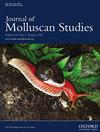利用傅立叶变换红外光谱分析、分类和鉴定腹足类运动粘液
IF 1.2
4区 生物学
Q2 MARINE & FRESHWATER BIOLOGY
引用次数: 0
摘要
粘液是许多腹足类动物表型的决定性特征。粘液的材料特性是根据粘液的组成、结构和性能之间的关系进行选择的产物;然而,迄今为止,有关这方面的研究还很少。在这里,我们介绍了衰减全反射傅立叶变换红外光谱(FTIR),它是一种简便易行的分析技术,可记录、鉴定和分类沉积的腹足运动粘液,几乎无需干预。我们还探究了粘液对温度升高的反应,确定其保持水合状态的倾向(即抵抗变性),并以此为基础,根据光谱相似性绘制支系图。具体来说,研究了蛋白质的相对含量、二级结构、蛋白质与碳水化合物的相互作用以及热稳定性,结果表明不同物种之间存在显著差异。通过整理和比较 12 个物种和 7 个超科的 648 个光谱,我们发现甚至可以仅根据腹足类分泌的足部粘液对其进行分类。我们还将这一结果与之前公布的系统发生学数据和分类法进行了比较,结果显示属种划分的命中率达到了 100%,这意味着粘液傅立叶变换红外光谱也可能成为基于野外的生物多样性研究的有力工具。本文章由计算机程序翻译,如有差异,请以英文原文为准。
Analysis, classification and identification of gastropod locomotive mucus by Fourier transform infrared spectroscopy
Mucus is a defining feature of many gastropod phenotypes. Its material properties are a product of selection acting on the relationship between mucus composition, structure and performance; however, to date, there are very few studies addressing this. Here, we introduce attenuated total reflection Fourier transform infrared (FTIR) spectroscopy as an accessible analytical technique to record, identify and classify gastropod locomotive mucus, as deposited, with practically no intervention. Advancing the field beyond previous spectroscopic studies, we also probe mucus response to a temperature increase, determining its propensity to remain hydrated (i.e. resist denaturation) and serving as the basis for building cladograms based on spectral similarities. Specifically, the relative content of proteins, their secondary structures, protein-carbohydrate interactions, and thermal stability were investigated and shown to have significant variation between species. Collating and comparing over 648 spectra across 12 species and 7 superfamilies, we report that it is even possible to classify gastropods based solely on their secreted pedal mucus. This was further compared to previously published phylogenetic data and taxonomies enabling a 100% hit rate of genus assignment, implying that mucus FTIR may also be a powerful tool for field-based biodiversity studies.
求助全文
通过发布文献求助,成功后即可免费获取论文全文。
去求助
来源期刊

Journal of Molluscan Studies
生物-动物学
CiteScore
3.00
自引率
8.30%
发文量
36
审稿时长
3 months
期刊介绍:
The Journal of Molluscan Studies accepts papers on all aspects of the study of molluscs. These include systematics, molecular genetics, palaeontology, ecology, evolution, and physiology. Where the topic is in a specialized field (e.g. parasitology, neurobiology, biochemistry, molecular biology), submissions will still be accepted as long as the mollusc is the principal focus of the study, and not incidental or simply a convenient experimental animal. Papers with a focus on fisheries biology, aquaculture, and control of molluscan pests will be accepted only if they include significant advances in molluscan biology. While systematic papers are encouraged, descriptions of single new taxa will only be considered if they include some ‘added value’, for example in the form of new information on anatomy or distribution, or if they are presented in the context of a systematic revision or phylogenetic analysis of the group.
 求助内容:
求助内容: 应助结果提醒方式:
应助结果提醒方式:


